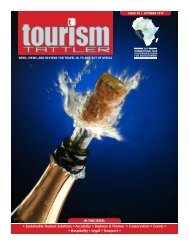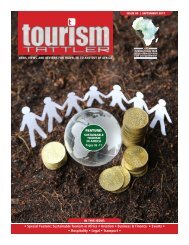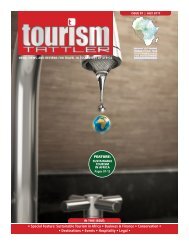Tourism Tattler Issue 1 of 2018
The first issue of TourismTattler’s quarterly magazine features the Magic of Kenya, the Secret Season of South Africa’s Whale Coast, the rehabilitation of Pendjari National Park in Benin, and a whole lot more about travel and business tourism in Africa.
The first issue of TourismTattler’s quarterly magazine features the Magic of Kenya, the Secret Season of South Africa’s Whale Coast, the rehabilitation of Pendjari National Park in Benin, and a whole lot more about travel and business tourism in Africa.
Create successful ePaper yourself
Turn your PDF publications into a flip-book with our unique Google optimized e-Paper software.
SNAPSHOT:<br />
Strongest Growth:<br />
Lagos<br />
Greatest Opportunity:<br />
Accra<br />
Keep Watching:<br />
Cape Town and Harare<br />
In USD terms Lagos showed the biggest decline in ADR <strong>of</strong><br />
19%. The Naira depreciated against the dollar by approximately<br />
16.5% in July/August 2017 driving ADR in USD downwards.<br />
In local currency terms ADR increased by 5.4%. Nairobi<br />
followed Lagos with an ADR decline <strong>of</strong> 8.4%. Here, increased<br />
supply coupled with a decline in demand forced hoteliers to<br />
compromise on rate with a knock on effect for ADR. A similar<br />
situation was apparent in Dar es Salaam. The former leader in<br />
terms <strong>of</strong> ADR growth in 2016, Lusaka was one <strong>of</strong> the weakest<br />
performers with negative ADR growth (in USD) <strong>of</strong> -6.2%. In<br />
local currency Lusaka’s ADR declined by 13.4%. ADR in Accra<br />
reduced by 3.2% in terms <strong>of</strong> USD but grew by 7.6% in local<br />
currency.<br />
Rooms Sold<br />
The economic recovery in Nigeria saw the number <strong>of</strong> room<br />
nights sold in its capital city, Lagos, increase by 17.6%. This<br />
significant increase <strong>of</strong>fset the 2.5% growth in supply . A<br />
similar situation was experienced in Accra, which saw a rise<br />
in roomnights sold to 13.7% as the economy emerged from<br />
a recent slump. Pretoria revealed positive demand increase as<br />
investment in casinos and commercial <strong>of</strong>fice<br />
space in new nodes drove growth. One <strong>of</strong><br />
the growth leaders in roomnights sold in<br />
2016, Cape Town showed negative growth<br />
in 2017 (-0.2%). New supply in the market<br />
has not yet been included in STR data and<br />
demand accommodated at such properties<br />
would therefore not be reflected which has<br />
influenced a downward trend in demand<br />
growth. Demand is therefore widely believed<br />
to have increased.<br />
Dar es Salaam showed the biggest decline<br />
in terms <strong>of</strong> room nights sold in 2017. An<br />
uncertain investment environment, coupled<br />
with a ban on the export <strong>of</strong> unprocessed gold<br />
and copper ore, did much to deter investors<br />
over this period. Room nights sold declined by<br />
almost 6.0% in Addis Ababa, with the State<br />
<strong>of</strong> Emergency in Ethiopia (only lifted in August<br />
2017) limiting opportunities for a recovery in<br />
visitor demand. The slowdown in the mining<br />
BUSINESS & FINANCE<br />
sector in Gaborone negatively impacted demand in Botswana’s<br />
capital city, whilst the continued election violence in Nairobi led<br />
to a 3.3% reduction in total number <strong>of</strong> rooms sold.<br />
Future Supply<br />
The number <strong>of</strong> hotel projects under construction remains<br />
highest in Addis Ababa. Several projects expected to come<br />
online in 2017 experienced delays and should be realised during<br />
the course <strong>of</strong> <strong>2018</strong>.<br />
These high levels <strong>of</strong> new supply (if all completed) are set to<br />
increase pressure on an already struggling market meaning that<br />
medium term outlook is therefore subdued.<br />
Planned supply in Lagos and Nairobi remains high and<br />
continues to place pressure on competitors. The nodal nature<br />
<strong>of</strong> competition in both cities is enabling quality developments,<br />
<strong>of</strong>fering international standards and value for money, to<br />
continue to outperform market trends.<br />
Also nodal in nature, Accra is expected to experience an increase<br />
in supply <strong>of</strong> just fewer than 900 new rooms. A large proportion<br />
<strong>of</strong> this supply will be positioned in the expanding airport node.<br />
The pace <strong>of</strong> growth in the city, combined with new oil and gas<br />
related investment is expected to limit the impact <strong>of</strong> the new<br />
supply on occupancy rates. Competitive pressure is therefore<br />
expected to be short term.<br />
About the author: Wayne Troughton is CEO <strong>of</strong> African-based<br />
specialist hospitality, real estate and leisure consulting company,<br />
HTI Consulting.<br />
About HTI Consulting: In 2017 HTI conducted 40 studies<br />
across 20 cities in Africa, venturing into both new territories<br />
(including Senegal, Guinea, Niger and Benin) as well as<br />
established markets (Nairobi, Accra, Dar es Salaam, Kigali,<br />
Liberia and Addis Ababa).<br />
For information information visit www.hticonsulting.co.za<br />
Jan/Feb/Mar<br />
Quarter 1 <strong>2018</strong><br />
<strong>Tourism</strong> <strong>Tattler</strong> Trade Journal 13

















